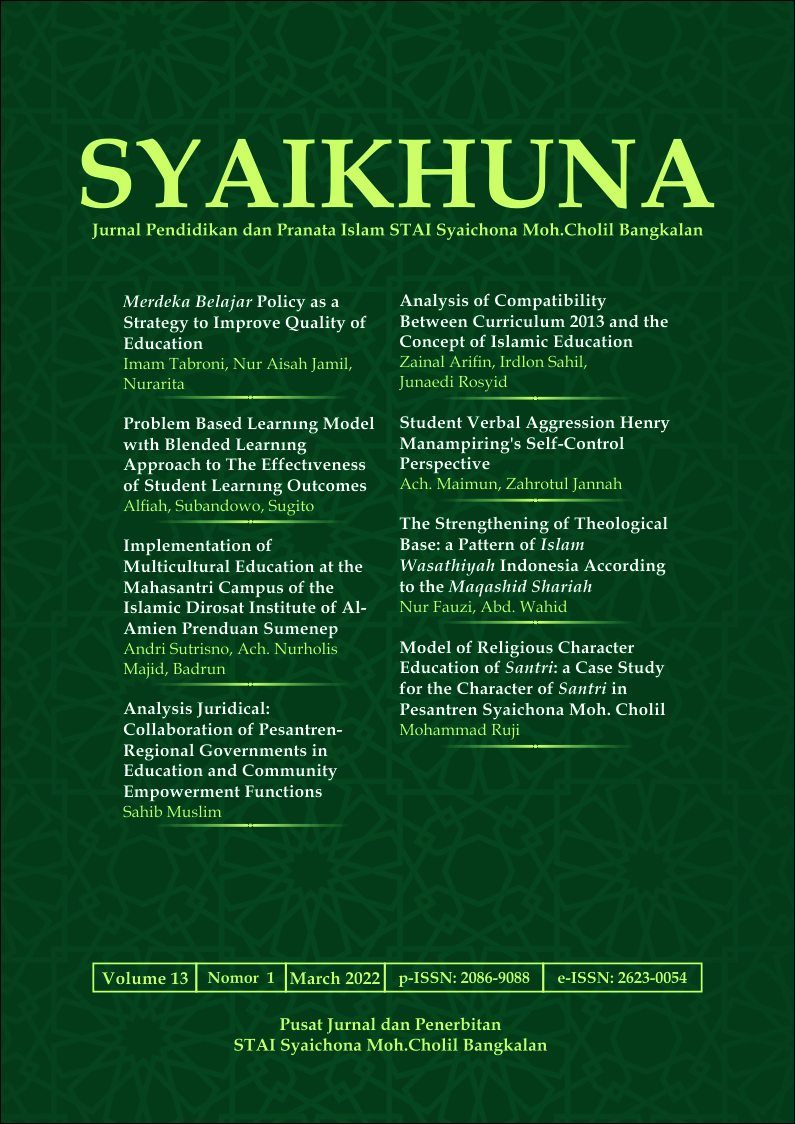Analysis of Compatibility Between Curriculum 2013 and the Concept of Islamic Education
DOI:
https://doi.org/10.36835/syaikhuna.v13i01.4603Keywords:
Curriculum 2013, Islamic education, Islamic conceptAbstract
This study aims to determine the suitability of the curriculum 2013 with a concept of Islamic education in terms of the substance of curriculum 13 with Islamic education. This study uses a library research approach by examining the implementation of the Curriculum 2013 in the field, which is then analyzed regarding its suitability with the concept of Islamic education. The data collection method is through three events, namely observation, interviews, and documentation. Observation is the core method in this research. It is done so that researchers get valid data and then check the validity of the data through data triangulation. This study reveals that substantially there is a match between the 2013 curriculum and the concept of Islamic education, which puts the soul above physical education. Islam always emphasizes that religious education takes precedence over education about the world, as the curriculum 2013 places attitude competence above knowledge and skills by integrating science and technology and spirituality. The curriculum 2013 touches on all aspects of human life. Islam is a religion of nature, so there is no dichotomy between science and technology because Islam believes both are sourced from Allah SWT. Through revelation and reason, humans get knowledge where Allah SWT created revelation and reasonReferences
A, Alhamuddin, (2018). “Sejarah Kurikulum di Indonesia: Studi Analisis Kebijakan Pengembangan Kurikulumâ€, Academia, Desember.
Muchlas Samani dan Hariyanto MS. (2012). Pendidikan Karakter, Bandung: Remaja Rosda Karya.
Abdul Majid dan Dian Andayani. (2012). Pendidikan Karakter Perspetif Islam, Bandung: Remaja RosdaKarya.
M, Mahbubi. (2012). Pendidikan Karakter; Implementasi Aswaja Sebagai Nilai Pendidikan Karakter, Yogyakarta: Pustaka Ilmu Yogyakarta.
bin Muhammad al-Luhaimid, Sulaiman. Syarh Arba’in Nawawi, Maktabah Syamilah, V.3.84.
Ahman al-Nasai, Abu Abdurrahman. (2004). Sunan al-Nasai, Lebanon: Dar al-Fikr.
E, Mulyasa. (2013). Pengembangan dan Implementasi Kurikulum 2013, Bandung: PT. Remaja Rosdakarya.
Shihab , M. Quraish. (1994). Membumikan al-Qur’an, Bandung: Mizan.
Maliki, Zainuddin. (2010). Sosiologi Pendidikan, Yogyakarta: Gadjah Mada University Press.
Kementerian Pendidikan dan Kebudayaan. (2011). Undang-Undang RI No. 20 Tahun 2003 Tentang Sisdiknas dan Peraturan Menteri RI Tahun 2010, Bandung: Citra Umbara.
Bin Syakir, Ali bin Abduh. (2012). Tujuan Pendidikan, Syukah al-Alukah, Nopember.
Hilal, Ibrahim. (2004). Agama dan Pemimpin Dunia, Kairo: Dar Nahdzoh al-Arabiyah.
Muhammad al-Asfahani, Al-Hasan bin. (1987). Tafsil al-Nasy’aain wa Tahsil al-Sa’adatain, Saudi Arabia, Dar Makatabah Hayat.
Mukarrom bin Madhur, Muhammad bin. (2008). Lisan al-Arab, Bairut: Dar Ihya al-Turats al-Arabi.
Miqdad yaljan. (1989). Ahdaf al-Tarbiyah al-Islamiyah, Riyad: Dar al-Hadi li al-Nasyri wa al-Tauzik.
Abu Abdillah al-Bukhari, Muhammad bin Ismail. (2002). Shahih al-Bukhari, Bairut: Dar Ihya al-Turats.
al-Karomi, Hasan Said. (1991). al-Hadi Ila Lughah al-Arab, Lebanon: Dar Lubnan li al-Tab’ah wa al-Nasyr.
al-Arifi, Samar Muhammad. (2007). Shalahiyah Mustalah al-Tazkiyah al-Insaniyah Kabadilin li Musthalahai al-Tarbiyah al-Mutamirrah wa al-Tarbiyah al-Dzatiyah, Jami’ah Malik Saud.
Loeloek Endah Poerwati, Sofan Amri. (2013). Panduan Memahami Kurikulum 2013, PT. Prestasi Putra Karya,
Shaltut, Mahmud. (1994). Akidah dan Syariah Islam, Terj. Fachruddin dan Nasruddin Thaha, Jakarta: Bumi Akasara.
Mas‘ud, Abdurrahman. (2002). Menggagas Format Pendidikan Islam Non Dikotomik, Yogyakarta: Gama Media.
Abduh, Muhammad. (1969). Fatihat al-Kitab, Kairo.
Downloads
Published
How to Cite
Issue
Section
License
Copyright (c) 2022 Zainal Arifin, Irdlon Sahil, Junaedi Rosyid

This work is licensed under a Creative Commons Attribution 4.0 International License.





